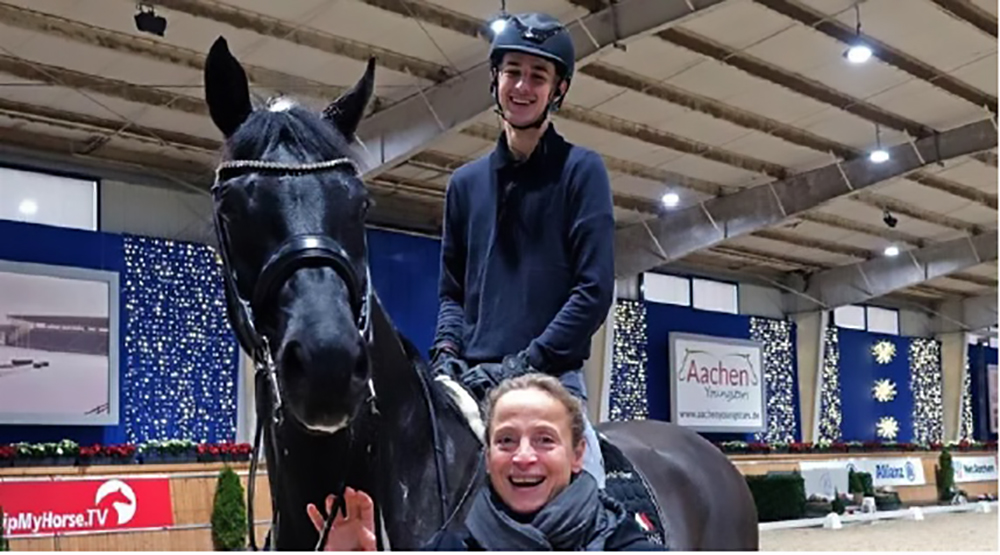
Aspiring young dressage riders have a much harder road to the top compared with their showjumping counterparts, says Isabell Werth, head coach of Aachen’s Campus Programme of Excellence.
Speaking about the future prospects of the young riders, Werth said Germany had some very good horse and rider combinations. “The decisive factor is how well they can also be integrated into senior-level sport. For example, in the scope of under-25 competitions and the Piaffe Prize, we can make sure the riders are well-prepared, but the decisive stage is introducing them to the adult circuit in the next step.”
Werth, who has won multiple Olympic and international titles, said it did not suffice to simply be a good rider, and have a good horse; “but it is something completely different also training this horse for top sport”.
“A talented jumping horse that has made it at Young Rider level, also tends to have the scope to succeed in jumping higher and further later on. That is different in dressage: The young rider, first of all, has to learn how to do piaffe and passage with their horse – this is a huge step. The gap is simply much wider in dressage than in jumping.”
Werth said she did not have a solution for the issue, but said she always pointed out the fact that “it doesn’t suffice just learning how to execute the exercises, it is training the horse that is the be-all and end-all”.
She pointed to her own experience as a young rider: “I was extremely lucky at the age of 17 to be coached by Dr Schulten-Baumer, who was always only interested in the Grand Prix. He exclusively occupied himself with training young horses for the Grand Prix sport. For him, it wasn’t important whether I took part in the Young Riders Tour on the way to this goal, or not. “Here’s a brief example: Gigolo was seven at the time and could definitely have competed in the Young Riders Tour, but Dr Schulten-Baumer said straightaway: ‘We are going to get him ready for the Grand Prix level. Because it is mostly too late if you start preparing yourself for U25 and the Grand Prix sport with a 10 or 11-year-old horse’.”
Werth says that, ideally, aspiring young riders have an experienced horse for the Junior and Young Rider Tour to gain experience and become well-versed in the exercises and learn how everything works.
“Parallel to this, they should be schooling on a young, talented horse for the Grand Prix.”

She said that Germany had the infrastructure, from breeding through to the training, to maintain its place as the premier dressage nation.
“There are strong combinations, but it has also been the same names for many years, who have internalised the training principle – Dorothee Schneider has been on the scene for years, so have the Rothenberger family, Theodorescu, Linsenhoff, Capellmann/ Lütkemeier. And when someone joins the ranks, like Jessica von Bredow-Werndl and Benjamin Werndl, then it is the result of long, hard work and training.
“Helen Langehanenberg is also a good example. She achieved her success after following a long and consistent path through training and working. The joy that continually introducing horses to the sport and training them brings and conveying this fun to young people was also decisive for me taking on this role at the CHIO Aachen Campus.”
The riders on the Dressage of the Programme of Excellence have reached the halfway mark, Werth said.
“One or two of them intend and will definitely be able to take up riding professionally. Others haven’t set this as their main goal, but are nevertheless extremely committed to the sport and are at a great level. Then, there are others, who are on the threshold of making a decision: ‘Shall I become a professional rider or start an apprenticeship after school?’.”
Werth said the programme supported students in many areas, not only sporting. “There are so many areas that ultimately determine whether they make it or whether something is still missing.
“In addition to talent, diligence and ambition, it is also about fitness – physical and mental – equine and stable management, diet, media coaching and many other aspects. A wide range of experts help the participants of the Programme of Excellence on their path ahead.”
Werth praised the Aachen Dressage Youngstars show, which gave riders the chance to compete at a high level at the end of the season. “Add to that, of course, also the myth of Aachen and the rider’s big dream of having the chance to compete next door in the Deutsche Bank Stadium one day. Aachen is Aachen and will always remain a special show.”




